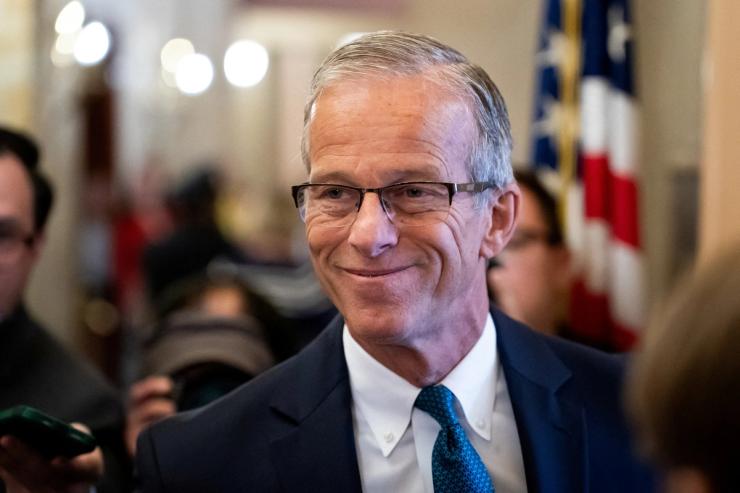The News
When John Thune came to the Senate 20 years ago, his maiden speech focused on overhauling entitlements — much to the “chagrin” of his staff, he recalls.
So it shouldn’t be a surprise that, when Thune got control over his first massive party-line bill as the new Senate majority leader, the South Dakota Republican put the same stamp on it.
Moderate in temperament but conservative in ideology, Thune surprised more centrist Republicans in recent days by adding more aggressive Medicaid cuts to President Donald Trump’s tax-cuts bill and aligning with conservatives who want to rein in Obamacare’s Medicaid expansion. Working with Trump, Thune also worked to gut clean energy subsidies, many of which were leftovers from Joe Biden’s presidency.
All told, Thune shaped a more conservative bill than the House did in several key areas. He acknowledged as much in an interview with Semafor: “And it’s not just me: That was the consensus.
“I’ve tried to … indicate to [the House] when they were moving their bill over there that we were going to be as conservative — or more so — than they are,” Thune told Semafor in an interview about the bill, which passed 51-50 and now heads to the House. “And in the end, we did.”
That approach got the incoming majority leader to the doorstep of passing Trump’s megabill. But Thune hadn’t only tossed his lot in with conservatives. All along, he’d courted moderate Alaska Sen. Lisa Murkowski, who didn’t love the rushed process — but did feel heard by him and his chief deputy, John Barrasso of Wyoming.
Thune’s mixture of appeals to the right and the middle of the GOP didn’t always look pretty. Sen. Thom Tillis of North Carolina, a cornerstone of Thune’s narrow majority, retired in the middle of this week’s floor debate and became an immovable opponent of the bill. But toeing the line between Murkowski and his conservative wing helped Thune pass the legislation by the narrowest possible margin on the Senate floor.
Thune said he’d told Murkowski he did “‘everything we can to accommodate your areas of interest and concern.’ And I think she would acknowledge that.
“We tried to be as flexible as possible in helping her get to where she feels like the state is being well represented and taken care of,” he added.
Murkowski, however, told Thune and the administration all along that tightening eligibility and work requirements for public benefits wouldn’t work for her state’s antiquated system.
In the end, she helped negotiate a far larger hospital relief fund for rural hospitals, even as last-ditch efforts to give her Alaska-specific aid foundered at times.
In this article:
Know More
When Thune texted with Tillis late Saturday, he sensed something was up.
“I was like: ‘Don’t do anything rash, take some time on this’ … he’s been very cagey about that for some time,” Thune said. “I just tried to encourage him not to react to anything that was happening in the moment, but to kind of step back a bit. He obviously decided that this is what he wanted to do.”
Thune called the timing of Tillis’s exit “unusual.”
Tillis’ seat is a problem, and potentially a big one, for another day. Most immediately, Thune needs to ensure House Speaker Mike Johnson is able to pick up his legislation and pass it. Already Rep. Don Bacon, R-Neb., is complaining about health care and energy changes while the conservative Freedom Caucus pans the bill’s deficit increases.
It was hard enough to get the “big, beautiful bill” through the Senate. Sen. Jim Justice, R-W.Va., whose state has a large number of Medicaid beneficiaries, said of the steep cuts to the provider tax: “Dag, I wish to goodness we didn’t have that. But you have everything else here that’s so good: What are you going to do?”
“I was a little surprised … President Trump, his feelings are my feelings. Get rid of fraud abuse and waste and absolutely have the work requirements,” Justice added. “And then, stop.”
That’s not what happened. Sen. Josh Hawley, R-Mo., called the more aggressive cuts “one of the strangest things” to happen to the bill.
Justice said it was “unfair” to solely blame Thune for the changes to the massive party-line bill, which also extends expiring tax cuts and creates some new ones. Thune’s predecessor Mitch McConnell said he “did an excellent job.”
“It is impressive that the leader was able to get such a conservative piece of legislation and get everyone on board,” said Sen. Katie Britt, R-Ala.
Thune’s genial demeanor, a 180-degree contrast from Trump’s, belies his deep-rooted conservatism. Yet Thune’s Midwest vibes are pretty helpful when it comes to a demanding president.
“We’ve had some fairly spirited conversations about … things he wants. And, you know, why I feel like we can or can’t do certain things.”
“There are always interesting conversations, as you might expect,” Thune added.
Other Republicans talk to Trump too, including Hawley — who then made a habit of informing Washington that Trump wants a softer touch on Medicaid.
“That’s a challenge. He’s so accessible that any senator that basically picks up the phone and calls him, he’ll answer it. They’ll weigh in with their side of the argument. He’ll agree to it,” Thune said, adding that at times “I have to ensure that he’s hearing the other side of the argument, sometimes even from the one that he’s hearing from our colleagues.”
Thune placated those worried about Medicaid impacts with a delay to the provider tax changes and the addition of a key radiation exposure health care fund, Hawley’s top legislative priority. Those early moves were crucial because, before he could get Murkowski, Thune needed to turn to his conservatives.
“We’ve had a more conservative, more collaborative process, that’s definitely true,” said Sen. Ron Johnson, R-Wis., who initially opposed bringing the bill to the Senate floor and had voted previously against McConnell as leader.
Johnson flipped his vote after Thune agreed to not only allow a vote on an amendment from Sen. Rick Scott, R-Fla., to cut federal payments to Medicaid expansion states – but also to lead the charge. The amendment split the conference badly, and never got a vote.
Through it all, Thune kept talking to Sen. Susan Collins, R-Maine, a moderate Mainer who blanched at the bill’s Medicaid cuts. He said he did “everything we can to try and get her to a good place. But sometimes it’s not going to be enough. And we understand that.” Ultimately she voted no.
With Tillis’ retirement, Thune is left praying that Collins runs again in Maine, a place where Thune says “nobody else [in the GOP] can win.”
“I don’t have any reason to believe she’s not. But that’s always a decision people make on their own,” he said.
Room for Disagreement
The past few days of exhausting floor debate involved lots of fingerpointing. Some Republicans believe it was a mistake to reject Tillis’ demands for a less harsh approach to Medicaid.
And Ron Johnson wanted a conference meeting where Republicans would approve or reject every major portion of the bill before bringing it to the floor.
“I can’t force the conference to do what it doesn’t want to do,” he said.
Burgess’s view
Thune tried to get out ahead of the megabill’s headaches early, championing a two-bill approach. He was overruled by Trump and Speaker Johnson, who passed his version of the legislation before Memorial Day.
Then Trump’s administration gave Thune until the next holiday to get it done.
Using Trump as vinegar and a July 4 recess as honey, the South Dakotan rammed through a bill that many Republicans probably would have opposed under other circumstances.
Now comes an arguably harder chapter: Making sure the bill and its Medicaid cuts don’t become a political albatross for Republicans.
Notable
- Among the Alaska-focused items that Republicans threw into the bill in a bid to win Murkowski’s vote: new tax benefits for whaling captains, per The New York Times.


